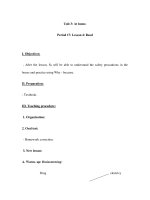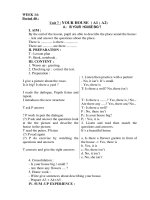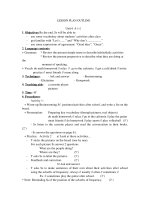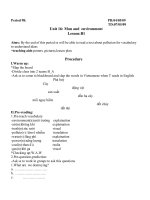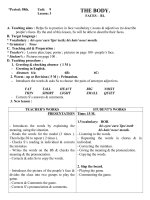unit 6 after school unit 6 after school i points by the end of this unit ss will be able to talk about popular after school activities make suggestions arrangements make accept and refuse an invita
Bạn đang xem bản rút gọn của tài liệu. Xem và tải ngay bản đầy đủ của tài liệu tại đây (111.37 KB, 7 trang )
<span class='text_page_counter'>(1)</span><div class='page_container' data-page=1>
<b>unit 6: after school</b>
<b>I. Points: by the end of this unit Ss will be able to</b>
- Talk about popular after- school activities
- Make suggestions, arrangements
- Make, accept, and refuse an invitation
<b>II. Language focus:</b>
1. Grammar:
- Adverbs of frequency
- Modals: used for invitations (shall, would)
2. Vocabulary:
(to) practice
(to) invite
(to) enjoy
(to) relax
(to) collect
(to) attend
(to) join
(to) invite
a wedding
a model
a collector
a collection
an anniversary
an assignment
a teenager
a comic
a musical instrument
a scout (boy scout)
a guide (girl guide)
sporty (adj)
celebration
you’re welcome
together
fun
<i><b>III. Teaching aids: book, pictures, word square-board, overhead...</b></i>
<b>IV. Teaching procedure:</b>
<b>unit 6: after school</b>
<b>Lesson 1: A1 P. 60-61</b>
<i>* Reading a dialogue about after-school activities and getting further practice in the present</i>
<i>progressive</i>
1. Pre reading:
<i>Networks</i>
Set the scene: We are going to read a dialogue between Minh and Hoa. They are talking about
their activities after school.
<i>T/ F prediction:</i>
<i>a. Hoa is doing her English homework.</i>
<i>b. Hoa and Minh are going to get a cold drink in the cafeteria.</i>
<i>c. Ba is learning to play piano in the music room.</i>
<i>d. Minh usually meet his friends after school.</i>
<i>e. Hoa likes playing soccer.</i>
2. While reading:
- Ss read the dialogue A1 P.60 and correct their prediction
<i><b>Key</b>: a. F b. T c. F d. T e. F</i>
- Ss read and answer the comprehension questions A1 P.61
- T corrects
<i><b>Key: a. </b>She’s doing her Math homework.</i>
<i>a. They’re going to get a cold drink in the cafeteria.</i>
<i>b. He’s in the music room</i>
<i>c. He’s learning to play the guitar.</i>
<i>d. He usually meets his friends.</i>
<i>e. She likes playing volleyball.</i>
3. Further practice:
Lan
do her homework
Those boys
computer games
Minh
watch TV <i>Example exchange:<sub>S1: What are you doing?</sub></i>
You
</div>
<span class='text_page_counter'>(2)</span><div class='page_container' data-page=2>
<i>S2: I’m doing my Math</i>
<i>homework.</i>
Nam
Play marbles
Long and Minh
chat
Ba
play guitar
4. Homework: answer the Qs A1 P.61 and learn by heart, do A1, A2 P.33-34 (WB)
<b>unit 6: after school</b>
<b>Lesson 2: A2 P.61</b>
<i>* Further practice in adverbs of frequency with the simple present tense for after-school</i>
<i>activities.</i>
<i>1. Revision: Slap the board</i>
T reads the Vietnamese words, Ss slap the English ones: watch TV, play computer games, play
soccer, go to the movies, read books
<i>Labeling A2 P.61</i>
Ss look at the activities and label the pictures
<i><b>Key:</b></i>
<i>1, reading/ studying in the library</i>
<i>2, swimming</i>
<i>3, playing video games</i>
<i>4, going to the movies</i>
<i>5, playing soccer</i>
<i>6, watching TV</i>
2. Practice:
<i>Word cue drill</i>
a. always/ go swimming
b. often/ go to the beach
c. never/ go to the library
d. usually/ play soccer
e. sometimes/ play computer games
f. often/ go to the movie
g. usually/ watch TV
h. often/ play tennis
i. sometimes/ do homework
<i>Example exchange:</i>
<i>S1: What do you usually do after school?</i>
<i>S2: I usually watch TV</i>
3. Further practice:
Language focus 2 – 5 P.71
<i>Matching</i>
<i>Ss read the information in the table and do the matching</i>
<i>Activities</i>
go cafeteria
ride bicycle
practice guitar
do homework
play computer games
<i>Frequency</i>
never
sometimes
often
usually
always
<i>Write it up </i>
Ss write sentences about Ba
4. Homework: write sentences about Ba and what you do on Sundays with frequency, A3 P.34
<b>unit 6: after school</b>
<b>Lesson 3: A3-4 P.62</b>
<i>* Reading a text for details about pastime activities</i>
<b>Team 1</b>
<b>Team 2</b>
</div>
<span class='text_page_counter'>(3)</span><div class='page_container' data-page=3>
1. Revision:
<i>Guessing game: Ss guess what their friends do after school, one choose an activity and the</i>
others guess
<i><b>E.g.</b> Do you usually (play soccer) after school?</i>
2. Pre reading:
<i>Pre teach:</i>
sporty: ham mª thĨ thao
a comic: tranh trun vui
a president: chđ nhiƯm
an anniversary: lƠ kû niƯm
(to) collect: su tÇm
a collector: ngêi su tÇm
a collection: bé su tËp
What and where
<i>True/ false prediction:</i>
<i>a. Nga, Ba, Nam are students in class 7A</i>
<i>b. They like sport very much.</i>
<i>c. Nga’s favorite pastime is jogging.</i>
<i>d. Ba likes collecting stamps.</i>
<i>e. Nam plays soccer every afternoon.</i>
<i>f. Nam usually watches TV.</i>
3. While reading:
- Present A3 P. 62
- Ss read and check their prediction
<i><b>Key</b>: a.T b.F c.F d.T e.F f.T</i>
- Comprehension questions: A3 P.62 a,-d,
<i><b>Key:</b></i>
<i>a. Her group is rehearsing a play for the school anniversary celebration.</i>
<i>b. He gets American stamps from Liz, his American friend.</i>
<i>c. The stamp collector’s club meets on Wednesday afternoon.</i>
<i>d. Nam never plays games.</i>
1. Post reading : A4 P.63
Matching: Ss listen and match each name to an activity
Key:
a. Mai- go to school cafeteria
b. Nam- rehearse a play
c. Ba- go to the circus
d. Lan- watch TV
e. Kien- tidy the classroom
<i>Tape transcript:</i>
<i>Nga:</i>
<i>Mai:</i>
<i>Nga:</i>
<i>Nam:</i>
<i>Nga:</i>
<i>Ba:</i>
<i>Nga:</i>
<i>Kien:</i>
<i>Nga:</i>
<i>Lan:</i>
<i>Mai, should we go to the school cafeteria?</i>
<i>OK. That’s a great idea.</i>
<i>What about you, Nam?</i>
<i>Sorry. I have to rehearse for a play with drama group.</i>
<i>Ba, do you want to join us?</i>
<i>Oh no. I am going to the circus tonight with my family. Sorry.</i>
<i>How about you, Kien?</i>
<i>I would love to, but I am going to tidy the classroom for Miss Lien this evening.</i>
<i>OK. Would you like to come with us to the cafeteria, Lan?</i>
<i>Sorry. I’m going to the movie theater. Have a good time. Bye.</i>
<i><b> Write it up: Ss write a short paragraph about after school activities, using the matching</b></i>
</div>
<span class='text_page_counter'>(4)</span><div class='page_container' data-page=4>
<b>unit 6: after school</b>
<b>Lesson 4: B1 P.64</b>
<i>* Making suggestions with Let s/ what about...?/ Why don t...?</i>“ ’ ’
1. Presentation:
<i>- Pre teach:</i>
an assignment: nhiệm vụ, bổn phận
fun : sự vui đùa, sự vui thích, trị vui
- <i>Presentation text: B1 P. 64</i>
- <i>Comprehension questions: B1 P. 64 a,-e, </i>
<i>Key:</i>
<i>a. Nam wants to go to the movie.</i>
<i>b. Lan doesn’t want to go to the movie because there aren’t any good movies at the moment.</i>
<i>c. Lan wants to listen to some music at her house.</i>
<i>d. hoa doesn’t want to go to Lan’s house because she has too many assignments.</i>
<i>e. It’s Saturday.</i>
<b>- Model sentences</b>
Suggestion:
* Let’s go to my house.
* What about going to the movie?
* Why don’t you relax?
Responses:
* Yes, let’s.
* Good idea
* Sorry, I can’t
2. Practice:
Word cue drill
let’s/ listen/ music <b>What/ go/ cafeteria x</b> <i><sub>Example exchange:</sub></i>
<i>S1: Let’s listen to some music.</i>
<i>S2: Yes, let’s/ Good idea</i>
<b>What/ watch/ movie x</b> why/ study/ library
Why/ join us
3. Further practice:
Mapped dialogue
You your friend
What ... do ... afternoon?
not good movie
too far... not have a bike
OK
... movie
... Mai’s house
... take a bus
<i>Example exchange:</i>
<i>S1: What should we do this afternoon?</i>
<i>S2: Let’s go to the movies.</i>
<i>S1: There isn’t any good movie on.</i>
<i>S2: What about going to (Mai’s) house? We can play a game together</i>
<i>S1: But it’s too far. I don’t have a bike.</i>
<i>S2: Why don’t we take a bus?</i>
<i>S1:OK</i>
4. Homework: write a dialogue, using Mapped dialogue, do B1 P. 36-37
<b>unit 6: after school</b>
<b>Lesson 5: B2 P.65</b>
<i>* Reading a magazine survey about the most popular activities of American teenagers and</i>
<i>getting further practice in leisure vocabulary</i>
<i>1. Revision: Pelmanism</i>
</div>
<span class='text_page_counter'>(5)</span><div class='page_container' data-page=5>
2. Pre reading:
<i>Pre teach:</i>
a teenager: thiếu niên (từ 13 19 tuổi)
a musical instrument: nhạc cơ
a model: kiĨu, mÉu
a scout (boy scout): hớng đạo sinh
a guide (girl guide): ngời hớng dẫn
(to) attend: chú tâm, tham gia
<i>Note: </i>
<i>Scout/ Boy Scout = member of an association which trains boys in various practical and</i>
<i>character building skills.</i>
<i>Guide/ Guide Girl = member of an association which trains girls in various practical and</i>
<i>character building skills.</i>
<i>Open prediction:</i>
Ss predict what American teenagers like to do in their free time.
3. While reading:
Ss read B2 P.65 and check their prediction
<i>Comprehension questions:</i>
<i>a. Which of the activities in the list of American teenagers do you think are also popular</i>
<i>among Vietnamese teenagers?</i>
<i>(watch TV, listen to music, go to the movies, help old people)</i>
<i>b. Are there many kinds of entertainment for teenagers in Vietnam? What are they? No, there</i>
<i>aren’t many</i>
<i>c. What organizations are there for teenagers in Vietnam? </i>
<i>(Young pioneers or different kinds of club for children)</i>
4. Post reading:
<i>Discussion</i>
in groups of four, Ss ask their friends what they like doing in their free time. Make a list of their
group’s favorite leisure activities.
<i>E.g. Our group join in the activity “books and copy books for poor students”. We collect old</i>
<i>books. We always keep our books clean and new. We don’t draw in our books...</i>
5. Homework: Remember favorite activities and organization of American teenagers, write
their group’s discussions, do B 4 P. 38-39
<b>unit 6: after school</b>
<b>Lesson 6: B3 P.66</b>
<i>* Making invitations with “Would you like..?”, acceptance of invitations and polite refusal.</i>
1. Revision: Ss talk about their discussion at previous lesson
2. Presentation:
<i>- Pre teach:</i>
pleasure: ý muốn, ớc muốn
a wedding: đám cới
Thanks anyway : dï sao rÊt c¸m ơn bạn
Youre welcome: không dám, có gì đâu
<i>- Set the scene: “Tomorrow is my birthday. I am going to have a party. I want you to come.</i>
<i>What do I say?”</i>
- Ss answer
- Have Ss listen to & repeat the dialogue once or twice
- Ss fill in the table: (with the key)
</div>
<span class='text_page_counter'>(6)</span><div class='page_container' data-page=6>
Invitation Polite refusal , acceptance
- Would you like to come to my house for
lunch?
- Will you join us?
- What about you?
Yes, I’d love to
I’m not sure
Thanks for inviting me. I’d love to, but...
- Have Ss practice the dialogue in pairs
- Call some pairs to role play the dialogue in front of class
3. Practice:
<i>Matching</i>
A B
1. Will you come along?
2. Would you like to listen to music?
3. What about reading comics?
4. Will you play video games?
5. I’ll have some milk. Would you like a
drink?
a. Oh, I’d love to, I like comics very much.
b. I’d love to, but I don’t know how to.
c. I’m not sure. I have many assignments.
d. Ok. I like pop music very much.
e. Great. Thank for inviting me.
<i><b>Key</b>: 1.c 2.d 3.a 4.b 5.c</i>
4. Further practice:
Ss make dialogues with these cues:
- do homework together
- go to the library
- play soccer
5. Homework: write dialogues with these cues in further practice, do B2 P.37-38
<b>Language focus 2 P.68-71</b>
<i>* Further practice in present progressive, time and subjects vocabulary.</i>
<i>1. Present progressive tense</i>
<i>- Mime Game:</i>
T brainstorms the activities at recess
In pairs, Ss mime the activities to each other. Then some of them present in front. Ss make Ss
about the activities in the present progressive tense
<i>- Language focus 2- 1 P.68</i>
+ Have Ss do themselves
+ Have one S write on the blackboard
+ T gives correct answer
<i><b>Key</b>: is doing, is writing, is reading, is cooking, are playing, is kicking, is running</i>
2. Time:
- Language focus 2- 3 P.69
<i><b>Key: </b></i>
<i>b. a quarter past seven or seven fifteen</i>
<i>c. half past ten or ten thirty</i>
<i>d. six forty five or a quarter to seven</i>
<i>Survey</i>
<i>Name</i> <i>get up</i> <i>go to school</i> <i>have dinner</i> <i>do homework</i> <i>go to bed</i>
<i>Example exchange:</i>
<i>S1: What time do you get up?</i>
<i>S2: at 6.00</i>
</div>
<span class='text_page_counter'>(7)</span><div class='page_container' data-page=7>
- Language focus 2- 4 P.70
-
<i>Lucky numbers</i>
1. What do you learn in History lesson?
2. What about subject do you learn about books and
writer?
3. LN
4. Do you learn about different countries in Geography?
5. How often do you have English classes?
6. What do you learn in Math?
7. LN
8. What do you do in a Computer Science class?
9. LN
10. What subject do you need pencils, paints, paper?
11. Do you learn new songs in Art lesson?
12. What lesson do you learn how things work?
1. past and present events in Vietnam
and around the world
2. Literature
3. LN
4. Yes
5. [free]
6. graphs, equations, calculator...
7. LN
8. how to use a computer
9. LN
10. Art
11. No
12. Physics
4. Homework: write sentences, using the survey 2-time
</div>
<!--links-->
